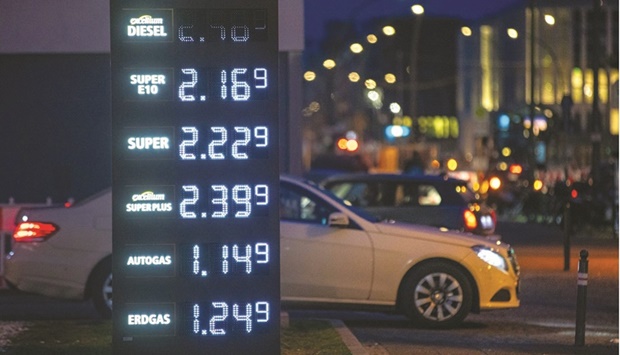Eurozone inflation accelerated to another all-time high as Russia’s invasion of Ukraine roiled global supply chains and provided a fresh driver for already-soaring energy costs.
March consumer prices surged 7.5% from a year ago, up from 5.9% in February and more than the 6.7% median estimate in a Bloomberg survey. Showing the increasingly broad nature of the advance, a core gauge excluding volatile components also hit a new record.
Friday’s data follow inflation overshoots this week from Spain and Germany that prompted investors to bring forward bets on when the European Central Bank will end almost eight years of negative interest rates.
Under pressure to act as households across the 19-member currency bloc are squeezed, the ECB in March announced an accelerated exit from asset purchases, with some policy makers calling for one or more rate hikes by year-end.
Bundesbank President Joachim Nagel on Friday urged the ECB to respond to the accelerating price pressures, saying “the inflation data speak for themselves.”
“Monetary policy should not pass up the opportunity for timely countermeasures,” he said.
ECB Vice President Luis de Guindos hopes price gains that are now more than three times the 2% target will peak in the next month or two. But that’s far from certain: Russian President Vladimir Putin threatened Thursday that he’d halt natural-gas supplies to countries unwilling to pay for them in roubles – jarring energy markets again.
In a release on Friday, S&P Global said its Purchasing Managers’ Index showed input-price inflation in the euro area hit a four-month high in March, stoked by higher commodity, fuel and energy costs.
“The question is whether the worst is behind us now and that seems doubtful,” said Bert Colijn, senior eurozone economist at ING. “From here on there are multiple factors stemming from the war that are set to keep upward pressure on prices.”
German 10-year yields were three basis points higher at 0.58%, having earlier climbed as high as 0.62%, while their Italian peers also pared an advance.
“As these pressures continue to build, we forecast price growth will accelerate in the next few months. Today’s reading point to inflation peaking above 8% this summer,” says Maeva Cousin, senior economist at Bloomberg.
It’s not just inflation. Economic expansion, which has been underpinned by the loosening of pandemic restrictions, is also in jeopardy as rising prices curb consumption, and the war crushes confidence and investment.
Germany could face a recession if Russia turns off the gas taps, advisers to Chancellor Olaf Scholz warned this week. Governments are paring back growth outlooks and the heightened uncertainty has led companies such as car-parts maker Schaeffler AG to scrap earnings guidance.
“I really believe we’re underestimating the medium-term impact of this war,” OECD chief economist Laurence Boone told Bloomberg Television on Friday. “The longer the war will last, the more uncertainty we have and the more worried we’re getting because uncertainty deters consumer purchases and business investment.”
For ECB chief economist Philip Lane, officials should be ready to adjust monetary policy in either direction.
“More than ever, it is important to maintain optionality in the conduct of monetary policy.” he said Thursday in a speech in Paris. “In current conditions, it is especially important to remain data-dependent and for optionality to be two-sided.”

Fuel prices seen at a TotalEnergies gas station in Berlin. Eurozone inflation accelerated to another all-time high as Russia’s invasion of Ukraine roiled global supply chains and provided a fresh driver for already-soaring energy costs.


